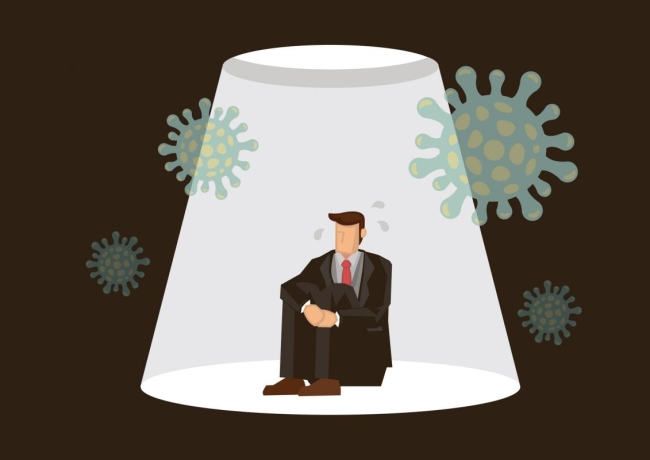You have /5 articles left.
Sign up for a free account or log in.

hofred/istock/getty images
I suppose that in its way it’s a funny story -- or at least a textbook example of O. Henry, “Gift of the Magi”-style irony. Back in October, I participated in an online roundtable on the challenges of supporting faculty members during the pandemic. One of the more interesting ideas that arose, in my mind at least, is the crucial difference between autonomy and isolation. (Spoiler alert: autonomy, good; isolation, very, very bad.)
The organizers of the event encouraged me to write something on the topic, which I readily agreed to do. But ever since, I’ve found myself so paralyzed by that very isolation that the piece almost didn’t get written. And it’s only the looming prospect of widespread vaccination, herd immunity and a return to in-person interactions on campus in the fall -- along with, probably, the first dose that’s now in my arm -- that’s made it possible for me to write this now. That vision of a renascent fall to which I cling may be like the feather that Dumbo clutches in his trunk, but let me have it, please. For now, at least, it’s allowing me to fly again.
Over the recent semester break, my forced exile from others -- from students and colleagues, from children and grandchildren in the Midwest and on the East Coast -- was driving me to a dark place. Although I haven’t reached traditional retirement age, I can now just make it out in the middle distance. And for the two months between Thanksgiving and the Martin Luther King Jr. Day holiday, a time when I would typically be renewing and enriching my connections to loved ones I don’t see on a daily basis, I found I couldn’t concentrate on the work in front of me -- only on making plans to walk away from that work.
I built elaborate spreadsheets sketching out various retirement scenarios; I put aside work on the book I was supposed to be writing and instead wallowed in a debauch of beach reading, with nary a beach in sight. Yet now that I think about it, I was, for all practical purposes, beached.
Isolation and Autonomy
We faculty members value our autonomy over all things -- the great privilege, increasingly rare in our increasingly corporatized world, of being left alone to do our work according to our own lights and rhythms. Outside the hardscape of our classes, office hours and committee meetings, we’re given a great deal of latitude to define the contours of our work environments. According to the old saw, we’ve exchanged a bit of earning potential for a bit of freedom. And while at times I’m jealous of the salaries of my English major friends who added a J.D. rather than a Ph.D., when we talk, it’s books and ideas they want to discuss. I covet their seeming financial freedom; they covet my intellectual and imaginative freedom, the liber in my liberal arts vocation -- my autonomy.
But one of the messages of COVID for me over the past year has been that autonomy is different than isolation. Autonomy, I want -- isolation, not so much. In the 1932 film Grand Hotel, Greta Garbo’s character, Grusinskaya, utters the words for which the actor is best remembered: “I want to be alone … I just want to be alone.” Interestingly for my purposes, Garbo later claimed never to have made her most famous remark, the celluloid evidence notwithstanding. “I never said, ‘I want to be alone,’” she told John Bainbridge in a piece in Life magazine in 1955. “I only said, ‘I want to be let alone!’ There is all the difference.” All the difference indeed: the difference between isolation and autonomy. I don’t really want to be alone.
According to friends and family, one of my most annoying habits is a marked tendency to reach for a moment in James Joyce’s writing as illustration for almost any point I’m trying to make. In this case, the moment comes from his short story “A Painful Case.” The story focuses on Mr. James Duffy, a misanthropic egomaniac; more than just his first name connects his story to that of his author. Because he thinks himself too good for the company of others, he holds them at arm’s length.
The story’s opening sentence, through the lens of free indirect discourse (what, in fiction writing workshops, is called close third-person narration), gives us a glimpse into Duffy’s soul from Duffy’s perspective and in something approaching his own voice: “Mr. James Duffy lived in Chapelizod because he wished to live as far as possible from the city of which he was a citizen and because he found all the other suburbs of Dublin mean, modern and pretentious.” (Talk about “mean, modern and pretentious”!) Though the reader grows suspicious of the protagonist’s self-assessments, Duffy would appear to enjoy what we’d call autonomy. He asserts, with the speaker of William Ernest Henley’s poem “Invictus,” “I am the master of my fate, / I am the captain of my soul.”
By the end of the story, however, Duffy feels shunned by the very citizenry he prides himself on shunning at the story’s open: “No one wanted him; he was outcast from life’s feast.” Duffy wants to be alone -- but he doesn’t want to be lonely. He craves the freedom to choose to be alone without being condemned to loneliness. Garbo’s Grusinskaya pleads, “I want to be alone,” but no one has ever said, “I want to be lonely.”
Introverts in the Academy
Over the course of my COVID-enforced semi-isolation, I have come to realize that although I’m an introvert, I’m an introvert who requires -- indeed, craves -- a vibrant human setting in order to do my best work. I have colleagues in the performing arts who respond positively to “the roar of the greasepaint, the smell of the crowd” rather than running from it in terror as I would. They’re a stone-cold wonder to me. Yes, of course, some extroverts do manage to survive the lonely process of academic credentialization, but no profession that requires a four-year undergraduate degree followed by five to 10 years of isolated specialist study is actively recruiting “people who need people.” The vast majority of them would die of inanition by the side of the road.
As our definitions have over time become more subtle, most of us now realize that an introvert isn’t simply someone who doesn’t enjoy spending time with other people, who “wants to be alone.” Rather, it’s a question of where one derives one’s energy, and for an introvert, a social opportunity like a public lecture or even a college seminar can be enormously rewarding but also costly. I think of it this way -- when I walk into my classroom, I enter with a sort of short-term psychic energy deficit. I’ve spent some time (sometimes hours, sometimes days) thinking about the class. Both formally and informally -- consciously, subconsciously and unconsciously -- I’ve been preparing for it. Now in my fourth decade of college teaching, I don’t think I’ve ever walked into a class without at least butterflies, and often something more like brawling wolverines, in my stomach.
But a good class provides that sense of flow that psychologists have described: clock time becomes irrelevant, the conversation takes on a life of its own and before I know it, students are nervously straightening their books in that universal signal that class is over. And walking out of that seminar room -- I’m picturing my favorite as I write -- I’m walkin’ on sunshine. The interactions with students have re-energized me; I leave the space with more life force than I brought into it. I’ve sunk a lot of myself into that class, and that investment has come back to me in spades. (Indeed, I realized years ago that I can’t teach an evening class, as it more or less guarantees a sleepless night.)
But during the pandemic I teach -- “walking in” to my Zoom classroom (though I still haven’t figured out how to do that quite nonchalantly) with those same feral animals wrestling in my stomach -- and just don’t get enough back. I start class in the hole and end in a pit. It’s not that the conversations aren’t sometimes terrific -- they are, though I have to admit, my slugging percentage is certainly down this season. But unlike my Sheetrock-and-whiteboard classroom, my Zoom sessions always leave me more drained, and feeling more alone, then when I entered them.
It’s not a situation that’s limited to the classroom. For the past three years, I’ve been directing the humanities center at my college, and a big part of that job is creating public programming for our interdisciplinary space. Last summer, in an effort to build intellectual community for those many of us feeling isolated during the pandemic, we hosted a series of scholarly talks and conversations that we called “Texts for These Times.” At the beginning, the topics tended to be a bit on the nose -- I opened with a presentation on Kyrie, Ellen Bryant Voight’s sonnet sequence about the 1918 flu pandemic, and we heard about Thucydides and Lucretius on the Great Plague at Athens and Daniel Defoe’s A Journal of the Plague Year. Over the course of the summer, we broadened our remit somewhat -- my former English department colleague, the poet Claudia Rankine, for instance, joined us to think about another of the season’s devastations, the murder of George Floyd, by way of her forthcoming book, Just Us.
Our audiences -- students, faculty, staff, parents, alums -- were grateful for the programming and gracious in their feedback. And we were pleasantly surprised, as many other organizations were simultaneously being surprised, by the size of those audiences -- sometimes double what we would have expected for an on-campus event. By any reasonable metric, we had responded quickly and thoughtfully to the crises of the spring and summer of 2020, and shown how the humanities might help us to think about our situation. Yet in the background, I was feeling increasingly despondent.
For a few weeks, I walked around with something like an earworm lodged in my brain. But an earworm, at least as I understand the term, is a sample of a catchy pop song that invades your mind unbidden that you just can’t shake, whereas I was hearing a few instrumental bars -- familiar, but somehow elusive -- from what sounded like a blues number. Only very recently -- indeed, during the writing of this piece -- did I suddenly realize what I’d been hearing on repeat was B. B. King’s “The Thrill Is Gone.” Sometimes the unconscious is about as subtle as our early-summer COVID programming.
Now, months later, I feel as if I can see the light at the end of the tunnel, and I simply refuse to believe it’s the headlight of yet another oncoming train. When we come back together on campus in the fall, things will look different than before the time of COVID -- we’ll be masked, perhaps, and socially distanced, almost certainly, and some aspects of the work, the life, that I’m missing will probably never return. But this introvert, at least, will return with an increased appreciation for the value of human community, even as someone who regularly needs to unplug himself from it. Perhaps it’s only through these warm and human “interruptions,” after all, that our autonomy is given shape and meaning.








